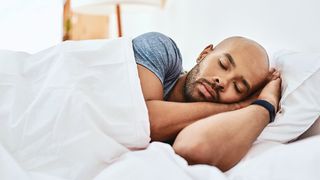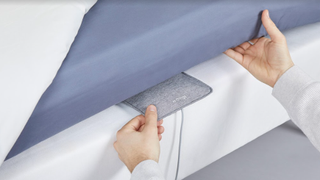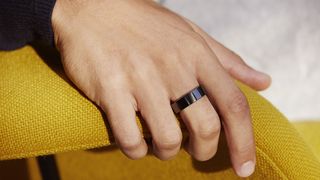Can tech improve your sleep?
What you need to know about the science of sleep tracking

There are many activity trackers, devices and apps designed to track your sleep. Many sleep tech companies claim these solutions can help you understand your sleep, get more rest and build better sleep habits. But is sleep tracking accurate? And, importantly, can tech improve your sleep?
The best sleep trackers include many of the best fitness trackers, like the Fitbit Charge 4 and the Honor Band 5, as well as headbands, like the Philips SmartSleep Deep Sleep Headband and smart rings, like the Oura.
There are also other devices built solely for sleep tracking that don’t have to be worn, like the Withings Sleep Analyzer, which slides under your mattress.
The quality of our sleep can impact our daily lives and long-term health in various ways. A lack of sleep can negatively impact our ability to make decisions and solve problems, our mood, and mental health. It can also increase the risk of developing chronic health problems.
Creating tech to help people better understand their sleep and even improve the length of time and quality of their sleep is a no-brainer for tech companies. The question is, can sleep trackers really improve your sleep and deliver on their promises, or are these devices all health tech hype? In this guide, we’ll look at how sleep trackers work and how they might help you to sleep better.
Sleep tech: what is sleep tracking?
Sleep trackers are often fitness trackers or smartwatches worn on your wrist, head or finger. There are also slim, mat-like devices that sit under your mattress.
Sensors inside these trackers, such as an accelerometer to detect movement and an optical heart rate sensor to measure your heart rate, measure data throughout the night.
Get daily insight, inspiration and deals in your inbox
Sign up for breaking news, reviews, opinion, top tech deals, and more.
An algorithm then uses the data to determine how you slept, and an accompanying app displays a graph that shows you when you went to sleep and woke up, the times you woke up in the night, and your sleep stages, like ‘light’, ‘deep’ and ‘REM’.

But how accurate is the data your sleep tracker collects?
Dr Jamie Zeitzer, assistant professor at Stanford University in the Department of Psychiatry and Behavioral Sciences and the Centre for Sleep Sciences and Medicine, tells us, “These devices – even the best research-grade devices – are okay at determining sleep and wake, but only in individuals who have consolidated sleep.
“If you have many awakenings over the course of the night, these devices are highly inaccurate,” he continues. “And, unfortunately, they do not track stages of sleep particularly well.”
Much of the recent research on the efficacy of sleep tracking tech suggests the same thing. Yes, these devices can provide accurate information about when most of us fall asleep and wake up. But the results about sleep stages were hit and miss.
Sleep tech: can sleep tracking improve sleep?
Right now, sleep tracking tech can only do so much. But is that enough to make a difference?
“For most people, telling them how much they slept is not a particularly important piece of stand-alone information,” Dr Zeitzer says. “If these devices were integrated into other pieces of technology and could begin to understand why we did or did not have a good night of sleep, then we are getting somewhere.”
We spoke to several people who said that seeing data about the time they’ve spent asleep and awake has been beneficial because they’ve taken this knowledge into their own hands.
Katie Moffat, who uses a Fitbit Charge 4 to track sleep every night, told me she noticed that drinking alcohol raised her sleeping heart rate and reduced her amount of REM sleep as a result.
“It’s not a magic bullet for solving sleep problems, but it makes me more conscious of the things I should and shouldn’t be doing, to improve both length of sleep and the quality,” she say.” I think it’s okay not to take it all too seriously but to use it as a kind of waymark.”
Roi Perez tells us via Twitter that sleep tracking has been “boring”, but “it’s more to do with how you act on that data it collects.”
Perez explains: “FitBit showed me that when I take Kalms for sleep I spend more time in deep sleep and wake up feeling more refreshed. So I know exactly when to take them and exactly when I can expect to wake up.”

Jennifer Harrison shared a similar story on Twitter. “I do find tech helps me improve my sleep when it comes to being more aware of my time,” she says. “How late am I going to sleep? When should I stop looking at screens? That’s made a big difference for me.”
Sleep tracking data can also be an indicator of other general health, and even mental health changes. “When I was suffering from depression, it helped me see a pattern in the reduction of my early morning waking, which was a reassurance,” Keith Grimes tells us. “I can use my wake time to help identify when stress is creeping up, too.”
TechRadar writer Tom Bedford, meanwhile, recently discovered that regular sleep tracking could lead to better running performance and understanding of sleep habits.
Although these stories are largely positive, they do require us to take sleep data and make sense of it ourselves. Sometimes, of course, that's straightforward. When we notice, say, that alcohol is disrupting our sleep, it's easy to make appropriate changes, whether that's drinking less booze or stopping altogether.
But it’s not always obvious what we need to do, and that’s where the value of sleep trackers can become questionable. Because although some trackers do make recommendations, they’re often quite vague and generic.
“I’ve tracked sleep for ages and have possibly identified where my sleep can be improved," Andy Boxall tells us via Twitter. “But the problem I constantly face is that none of them tell you what to do with the data to actually improve your sleep.
"It’s a worry too. If I saw a sudden change in sleep activity, what should I do about it? The wearable would offer no advice, I suspect.”
Sleep tech: how to make sleep tracking work for you
If you want to try sleep tracking, you need to be prepared to think about your sleep and behavior if you're going to improve it; otherwise, you're just collecting lots of colorful graphs. Although there's nothing wrong with that, it's essential to manage expectations about how life-changing a sleep tracker can really be.
In the future, sleep trackers might provide us with more personalized and meaningful information, like how what we eat, where we go, our moods, the TV shows we’ve watched, the people we’ve seen and the medications we take might impact our sleep.
But for now, that information either doesn't play a part in tracking or, in a few cases, has to be entered manually – still leaving room for us to miss the things that can affect sleep we don't already consider to be important. (Whether we'd want our devices to have that level of knowledge is another conversation entirely.)
We also need to be wary of the problems that can arise when we track data about ourselves every day. Studies suggest that when some people track their daily calorie intake and movement, it can lead to an unhealthy preoccupation with our tech – and the same can happen when it comes to sleep, sometimes referred to as 'orthosomnia'.
"Someone who thinks they are sleeping okay can be told by a device that they are sleeping poorly, whether that's true or not," Dr Zeitzer explains. "This can create a situation in which the person starts to worry about their sleep and develop insomnia."

None of this is to say sleep tracking is a waste of time. Plenty of people we spoke to found out more about their sleep and themselves through tracking – but it won't suit everyone.
"For individuals who like to optimize various aspects of their lives, such as sleep, exercise or diet, getting a device that tracks these multiple domains could be useful," Dr Zeitzer says.
It might seem counterintuitive to suggest you can track your sleep, but shouldn't take it seriously. But until we get more meaningful suggestions and accurate data, it pays to look at your results from a sleep tracker as useful estimates that can help paint a bigger picture of your overall health and wellbeing right now, rather than seeing it as an exact science.
- What are the best fitness trackers?
Becca is a contributor to TechRadar, a freelance journalist and author. She’s been writing about consumer tech and popular science for more than ten years, covering all kinds of topics, including why robots have eyes and whether we’ll experience the overview effect one day. She’s particularly interested in VR/AR, wearables, digital health, space tech and chatting to experts and academics about the future. She’s contributed to TechRadar, T3, Wired, New Scientist, The Guardian, Inverse and many more. Her first book, Screen Time, came out in January 2021 with Bonnier Books. She loves science-fiction, brutalist architecture, and spending too much time floating through space in virtual reality.
